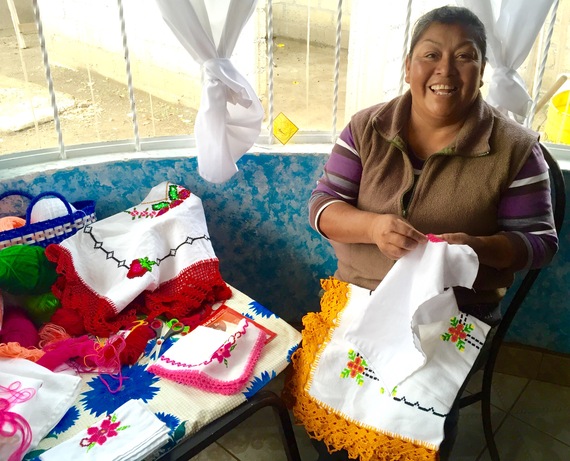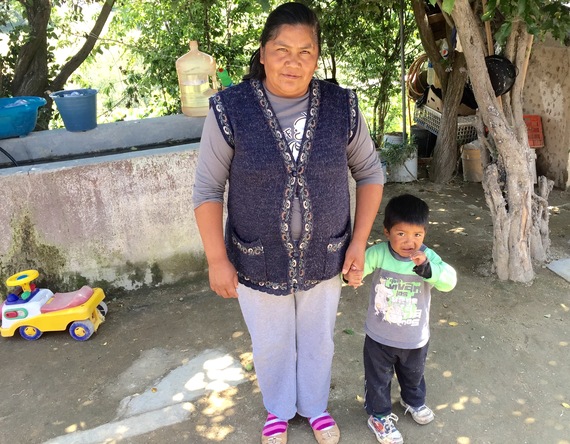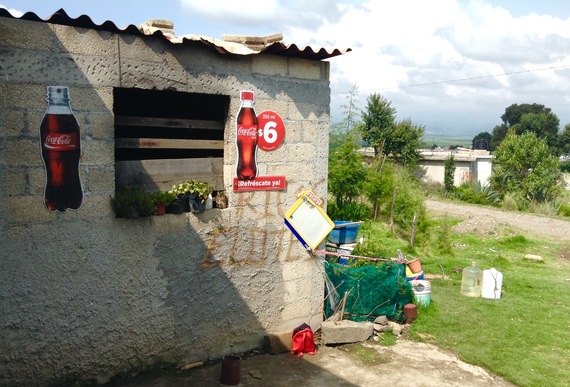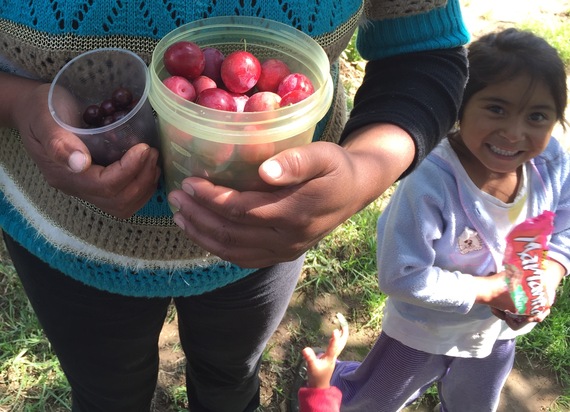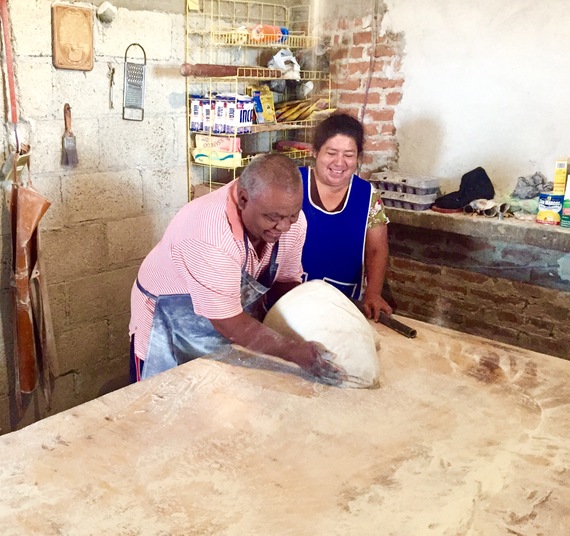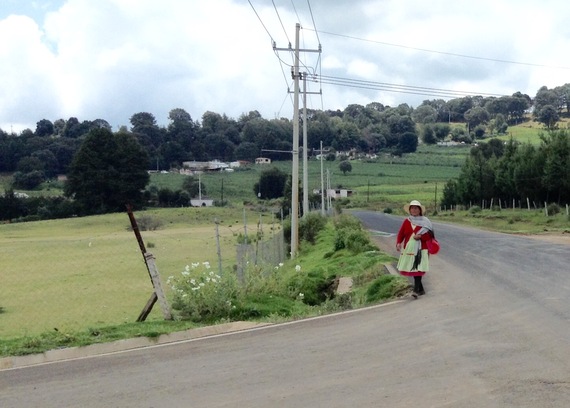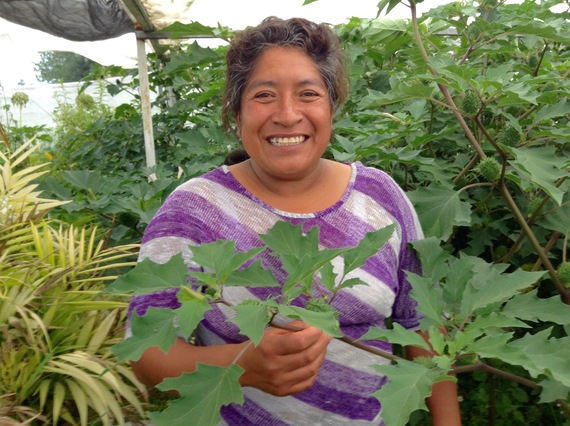Hortensia and I trudge up the winding dirt path toward a steep hillside dotted with tiny concrete homes. Clotheslines strung with brightly-colored skirts and shirts bake in the midday Mexican sun. A faded Coca-Cola sign instructs us to ¨¡refrescate ya!¨ for six pesos. Three turkeys strut by, gobbling hello, and a donkey quietly munches on some grass.
At the top of the hill, we reach a three-room house with a tin roof and a washing latrine out front. There's a doorway but no door; the windows have no screens or shutters. A little boy crouches in the yard, running a plastic dump truck up and down a pile of dirt. A plump woman stands off to the side, shaking out wet socks and hanging them on the line one by one. She wears a long, embroidered wool vest despite the heat.
¨Hola!¨ Hortensia calls out to her. ¨Vive aquí Graciela?¨ Does Graciela live here?
The woman puts down her basket of wet laundry and squints in our direction. ¨No, nobody by that name is here,¨ she replies in Spanish. ¨What are you girls looking for?"
Hortensia explains that we're here on behalf of VisionFund Mexico, a microfinance institution that provides small loans to the country's poorest residents. Graciela's recent loan, a few thousand pesos to spend on her clothing-selling business, has been fully funded on the crowdfunding platform Kiva, a VisionFund partner. We were there to see how Graciela's operation was doing, to take some photos and ask her some questions about her experience with the loan.
¨Okay, okay...I am Graciela,¨ the woman admits. ¨I thought you were Protestants. I thought you wanted me to join your church.¨
We all laugh as she unlatches her gate and leads us into the yard, through the doorway and to a stark bedroom with a concrete floor and a cross nailed to the wall. She pulls a giant cloth shopping bag from the single shelf and dumps its contents onto the twin bed, proudly spreading out articles of clothing, picking each up one at a time to show us. Scarves, ponchos, dresses, pants; ruffled and ironed; patterned and bold.
Each day, Graciela walks up and down the bumpy paths of her village, selling the clothes to her neighbors, who have become regular customers. Once every two weeks, she takes a taxi from her community, San Joaquín Lamillas, to the nearest town, San Felipe del Progreso. There, she catches a bus to a market in Mexico City, where she replenishes her supply. The journey takes five hours round trip.
Graciela's no stranger to Mexico City, she says; she lived there once, many years ago, working as a housekeeper. She returned to San Joaquín Lamillas to be closer to her family. Now her husband, a field worker, and their five kids and four grandchildren all live in the house with her. The boy out front is Gabriel, her grandson. She's been selling clothes for nearly five years and used this most recent loan to diversify her merchandise.
I ask her if the arduous bi-monthly trip to the capital has taken a toll. She shrugs. ¨Here in Mexico, we all work hard,¨ she replies. ¨It's just what we do. It's how we live.¨
Kiva partners with microfinance organizations all over the globe, and for the past decade, the company has raised hundreds of millions of dollars for people like Graciela. Users can lend as little as $25 to help finance everything from chicken farms to tech startups, and once their loans are paid back, they can reinvest the money in a different business of their choice.
The concept is simple: Provide resources to members of the world's poorest communities, individuals who would otherwise be cut out of the traditional banking system, and they'll use those resources to create more resources. Unlike handouts, the money is paid back as the borrowers grow their businesses and generate income for themselves. And it's a concept that works -- less than 6 percent of Kiva loans are defaulted on each year.
Three times a year, Kiva sends a group of fellows to serve four-month stints at their partner institutions, a chance to meet their borrowers in person and share their stories. They stationed me with their Mexican counterparts, where I've met with business owners -- mainly female -- in rural communities in Oaxaca, Veracruz, and the state of Mexico. If my dozens upon dozens of conversations with them are any indication, Graciela's stance on hard work is not a unique philosophy.
María Elena lives in a similar home just up the road from Graciela with her husband, Federico, and their four children. The family grows pears, plums and capulines -- a local fruit that tastes like a cross between a blueberry and a cherry -- on their property. Each night at 11 p.m., Federico and his teenage son load up their truck with fruits and make the overnight drive to the state of Michoacan in order to arrive at the market at dawn. ¨Everybody already has too many of them here,¨ María Elena explains of her produce. ¨So we sell our products in Michoacan, where we also buy mangoes and avocados to bring home.¨
The men won't leave until they've sold out of their products, and when they return home that afternoon, they'll take a nap and then wake up and repeat the process. María Elena stays home to tend to the crops, keep the household in order and take care of their young daughters, who aren't old enough to attend school yet. They bought the truck with their loan so they no longer have to travel by bus to sell their harvest.
We meet another woman named Graciela, who used her loan to buy equipment to open up ice cream store, in a tomato field across the main road in San Joaquín Lamillas. A few months ago, she was forced to shut down her shop due to a lack of demand. She took a job tending tomatoes in order to keep making payments on her loan. Rubbing her dirt-stained palms on her long denim skirt before giving us each a firm handshake, she tells us she's determined to reopen her store one day. In the mean time, she says she'll do whatever it takes to pay back her loan and provide for her five-year-old daughter.
A few towns over, in El Valerio, it's obvious that María Lucas has been investing loans in improving her lifestyle for more than a decade. A small color TV plays in the living room, a large dining table shimmers with attractive dishware, a personal chapel her husband built himself adorns the side yard. She raised and sold sheep for years before transitioning to a clothing sales operation similar to Graciela's. ¨By now, I know my customers' individual styles,¨ she says, adding that she buys clothing with specific clients in mind. In her spare time, she embroiders scarves and linens by hand to sell at the local market.
The smell of warm dough and butter wafts from Irma's kitchen seven hours southeast, in the Oaxacan village of Tetela. Every morning she bakes croissants and pizzas and her famous dedos -- long pastries stuffed with ham and sausage and cheese and hot sauce -- with her husband, Miguel. ¨When our neighbors can smell the pastries baking, they know it's time to come over,¨ she says, winking and wiping excess flour on her apron.
A few years ago, their teenage son, Freddie, was diagnosed with kidney failure, and the family began making regular trips to the largest nearby town, Tierra Blanca, for his medical care. Irma and Miguel always filled their van with their baked goods in advance, which they sold to the doctors and nurses. Freddie died two years ago, but they still frequent the Tierra Blanca hospital to sell their treats to the same people who cared for him. Freddie's portrait hangs proudly above the industrial-grade oven they bought with their most recent loan.
Florina also uses her income to pay for her child's medical care; her 18-year-old daughter has suffered from benign brain tumors since she was six. When she was first diagnosed, Florina, then a homemaker, suggested to her husband that she find a job to help contribute to the medical bills. Her husband, a bricklayer, refused to allow it, responding that a woman's place should be in the home. When his income failed to cover the costs of medical care, Florina says she put him in his place.
¨I told him, you aren't bringing in enough money to support us, so do you have any other suggestions?¨ she recalls. ¨Now, he's completely changed his mindset. He's very supportive of my business.¨ Five days a week, Florina travels up and down her hillside community of San Agustin Mextepec on foot and by truck, selling hair accessories, purses and jewelry to local residents. On her days off, she and her daughter board the local bus and make the six hour round-trip trek to Mexico City so she can receive the highest quality treatment available.
Like Florina, Rosa sells her wares door to door, walking the streets of Tierra Blanca looking for customers to buy the traditional Mexican sweets, or dulces, she has been making from scratch since she was a teenager. She wakes up at the crack of dawn each morning and begins baking: sugared coconut with pineapple, alfajores, dulce de leche, packaging each sweet in an individual plastic baggie and piling her basket high. ¨I never had to work in the fields because my mother taught me how to do this instead,¨ she says, offering us each a candied coconut. ¨So now I'm teaching my own nieces and grandchildren.¨
On the outskirts of the indigenous town of Ixtlahuaca, Domitila's also teaching her family the tricks of her trade. Many years ago, she inherited a large swath of land from her father-in-law many years ago, and began gardening for fun. Before she arrived on the property, it was little more than a barren field with a small house to live in. ¨I came here and started planting trees and everyone said, 'who is this crazy lady?'¨ she says with a laugh.
Now, what started as a simple hobby has flourished into a large-scale organic farm. Domitila cultivates rows upon rows of tomatoes and chili peppers in large greenhouses, raises chickens and turkeys, grows peach and pear trees, and recently opened a composting operation across the road. In her spare time, she makes intricate floral arrangements for weddings and quinceañeras, and she trains other VisionFund borrowers on the ins and outs of running a small business. She employs four full-time workers, including her 26-year-old son, who's the same age as the first tree she planted in her backyard.
Before I started working for Kiva, hard work to me meant sitting in front of a glowing screen for ten hours, reading and writing words on the internet in the comfort of my warm and well-lit office, an unlimited supply of granola bars on the counter and a corporate credit card in my wallet. For these women, hard work means waking up with the sun, testing the limits of their physical strength, spending every free minute taking care of their homes and families.
And they wouldn't have it any other way. ¨I don't ever want to lose my goals or ambition,¨ Irma replies when I ask what her biggest dream in life is. ¨I want to send my daughters to college,¨ says María Elena. ¨I want to build an outdoor roof so I can sell my dulces when it's raining,¨ says Rosa. ¨I want to die happy and healthy in my home,¨ says María Lucas. ¨I want producers like me to help each other and learn from each other,¨ says Domitila. ¨I want to open another ice cream store,¨ says Graciela. ¨I want my child to be cured,¨ says Florina.
Their dreams don't focus on figuring out the answers to existential questions, pining for fancy gadgets or even changing the majority of their day-to-day circumstances. They're modest dreams, and they're achievable dreams. They're dreams that would allow them to keep working, and to keep leading the lives that they're already leading.
This story originally appeared on the Kiva Fellows blog.

